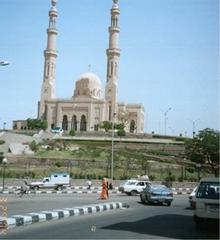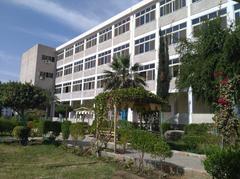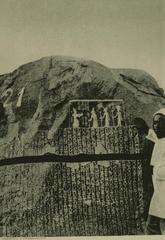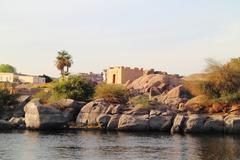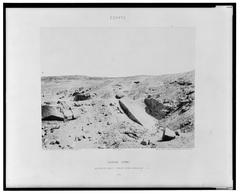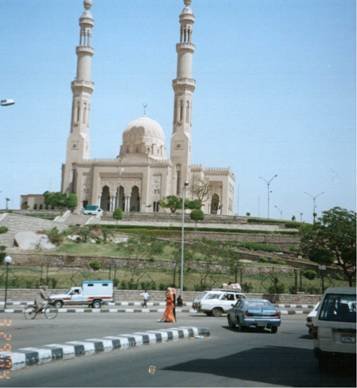
El-Tabia Mosque Visiting Hours, Tickets, and Aswan Historical Sites Guide
Date: 14/06/2025
Introduction
El-Tabia Mosque is a captivating Islamic landmark in Aswan, Egypt, perched atop a scenic hill overlooking the Nile River and the city’s vibrant landscape. Renowned for its architectural grandeur and panoramic views, the mosque stands as a testament to Aswan’s rich cultural diversity and Islamic heritage. Originally established on a 19th-century military fortress during Muhammad Ali Pasha’s modernization era, El-Tabia Mosque seamlessly blends historical depth with modern architectural brilliance (Hurghada Lovers; Wikipedia).
Welcoming visitors of all backgrounds, El-Tabia Mosque serves as a spiritual sanctuary, a cultural hub, and a prominent highlight among Aswan’s historical sites. This comprehensive guide provides essential details on visiting hours, ticket policies, accessibility, dress code, and nearby attractions, ensuring a respectful, insightful, and rewarding experience (Your Egypt Tours; Trek Zone).
Historical Background and Significance
Origins and Early Development
Located centrally in Aswan, El-Tabia Mosque stands on the grounds of a former military fortress established by Muhammad Ali Pasha in the early 19th century. The Arabic name “El-Tabia” translates as “fortress” or “battery,” referencing its strategic military roots and its role in Egypt’s defense modernization (Hurghada Lovers).
Architectural Evolution
The mosque was initially constructed in a Mamluk-inspired style, featuring domes, slender minarets, and ornate motifs. Over the decades, the original structure deteriorated and was ultimately demolished. El-Tabia Mosque was reconstructed in the 1970s, incorporating modern engineering while preserving historical elements, and was officially reopened in 1974 under President Anwar el-Sadat (Wikipedia).
Symbolism and Community Role
El-Tabia Mosque is not only a religious center but also a symbol of Aswan’s multicultural fabric and open society. Surrounded by lush gardens and rare trees, its elevated position offers breathtaking views of the Nile and the city. The mosque’s architecture—marked by a grand central dome, twin minarets, horseshoe arches, and Kufic calligraphy—reflects centuries of Islamic artistry and local craftsmanship (Your Egypt Tours; Hurghada Lovers).
Visiting El-Tabia Mosque: Practical Information
Visiting Hours
- Standard Hours: Daily from 8:00 AM to 6:00 PM
- Exceptions: Access may be restricted during prayer times, especially Fridays and major Islamic holidays. Confirm timings locally for updates (Egypt Today).
Tickets and Entry Fees
- Entry: Free of charge; donations for maintenance and community programs are appreciated.
- Access: The mosque and gardens are accessible to all visitors; the prayer hall may be restricted during services.
Accessibility
- Location: Central Aswan, near Corniche El-Nile Street.
- Mobility: The mosque stands atop a hill; paved paths and ramps provide access, though the incline may be challenging for some. Taxis can drop guests near the entrance (Egypt Today).
Dress Code and Etiquette
- Modest Attire: Shoulders, arms, and legs must be covered. Women should bring a headscarf (The Evolista).
- Shoes: Remove before entering the prayer hall.
- Behavior: Maintain silence and reverence. Seek permission before photographing inside or near worshippers.
Architectural Design and Layout
El-Tabia Mosque is an exemplary fusion of modern Islamic and Mamluk architectural traditions (Egypt Today). Highlights include:
- Grand Dome: Central dome (25 meters high), flanked by four semi-domes, marble-clad in the Ottoman and Mamluk style (Islamic Architecture in Egypt).
- Minarets: Two octagonal, 40-meter tall minarets with intricate geometric designs.
- Facade: White limestone, pointed arches with arabesques and Quranic inscriptions, muqarnas ornamentation (Aswan Governorate Official Portal).
- Interior: Spacious prayer hall for 2,000 worshippers, richly decorated mihrab, wooden minbar with mother-of-pearl inlay, stained-glass windows, plush carpets, and elaborate chandeliers (Islamic Art and Architecture).
Panoramic Views and Gardens
The mosque’s position within El-Tabia Gardens offers tranquil green spaces and spectacular vistas over Aswan, the Nile, and the desert hills. Elevated terraces and minaret balconies provide unique photographic opportunities, especially at sunrise and sunset (Lonely Planet).
Facilities and Amenities
- Gardens: Well-maintained with shaded benches and walking paths.
- Restrooms: Basic facilities near the entrance.
- Nearby Dining: Numerous restaurants and cafés along Corniche El-Nile Street (Egypt Today).
- Shops: Local markets and souvenir stalls nearby.
- Accessibility: Ramps and paved paths for wheelchair access.
Guided Tours and Special Experiences
El-Tabia Mosque is frequently included in guided walking tours of Aswan, often paired with visits to the Nubian Museum, Elephantine Island, and the bustling Aswan Market (Egypt Online Tour). Local guides provide deep insights into the mosque’s architecture, history, and its role within the community. Booking in advance ensures an informative and respectful visit.
Best Time to Visit
- Weather: October to April offers comfortable temperatures (23–30°C); avoid midday heat in summer (The Evolista).
- Timing: Early morning or late afternoon visits provide optimal lighting and quieter surroundings.
Safety and Security
Aswan is considered one of Egypt’s safest destinations for tourists. The mosque area is well-patrolled and frequented by locals and travelers alike. Standard travel precautions apply (The Evolista).
Nearby Attractions
- Nubian Museum: Showcasing Nubian culture, history, and art (Educba).
- Elephantine Island: Ancient ruins, museum, and traditional Nubian villages.
- Unfinished Obelisk: Largest known ancient obelisk in granite quarries (Egypt Today).
- Coptic Orthodox Cathedral: One of Upper Egypt’s largest, minutes from the mosque (Egypt Online Tour).
- Aswan Market: Lively bazaar for spices, textiles, and local crafts.
- Philae Temple: Island temple dedicated to Isis, a short drive and boat ride away.
Dining and Accommodation
- Food: Enjoy local Egyptian and Nubian cuisine at eateries along the Corniche and in the market (Educba).
- Accommodation: Options range from luxury hotels to budget guesthouses, many within walking distance or a short ride from the mosque (Educba).
Practical Tips for Visitors
- Footwear: Choose comfortable, easy-to-remove shoes.
- Hydration: Carry water, especially during hot months.
- Sun Protection: Use sunscreen, wear hats and sunglasses.
- Language: Arabic is official; English is widely spoken in tourist areas.
- Currency: Egyptian Pound (EGP); small notes are useful for donations and tips.
- Tipping: Customary for guides, drivers, and caretakers, though not mandatory.
Frequently Asked Questions (FAQ)
Q: What are the visiting hours for El-Tabia Mosque?
A: Daily from 8:00 AM to 6:00 PM, excluding prayer times and major Islamic holidays.
Q: Is there an entrance fee or ticket required?
A: Entry is free; donations are appreciated.
Q: Are guided tours available?
A: Yes, book in advance via local operators or the tourism office.
Q: What is the dress code?
A: Modest attire required; women should bring a headscarf.
Q: Is the mosque wheelchair accessible?
A: Ramps and paved paths provide access, but the hill may be challenging for some.
Q: Is photography allowed?
A: Allowed in gardens and exterior; permission needed inside the mosque.
Visuals and Media
[Insert high-quality images with alt tags such as “El-Tabia Mosque visiting hours exterior,” “Panoramic view from El-Tabia Mosque Aswan,” and “Interior dome and prayer hall of El-Tabia Mosque.“] Interactive maps and visitor information panels can enhance the experience.
References and External Links
- El-Tabia Mosque in Aswan: History, Visiting Hours, Tickets, and Travel Guide – Hurghada Lovers
- El-Tabia Mosque – Wikipedia
- El-Tabia Mosque – Your Egypt Tours
- El-Tabia Mosque – Trek Zone
- El-Tabia Mosque – Egypt Today
- Islamic Architecture in Egypt – Archnet
- El-Tabia Mosque – Lonely Planet
- Top 10 Tourist Attractions in Aswan – Egypt Today
- What to Do in Aswan – Egypt Online Tour
- Tourist Attractions in Aswan – Educba
- What to Wear in Egypt – The Evolista
- El-Tabia Mosque – TripAdvisor
- 7 Things Not to Miss in Aswan – GloboTreks
Conclusion and Call to Action
El-Tabia Mosque offers a harmonious blend of history, spirituality, and architectural splendor in the heart of Aswan. Its free entry, welcoming atmosphere, and proximity to other major sites make it an essential stop for any traveler. Respect local customs, plan your visit during cooler periods, and consider a guided tour for an enriching experience.
Ready to explore El-Tabia Mosque and Aswan’s historical treasures? Download the Audiala app for personalized travel tips and itineraries, and follow us on social media for the latest updates on Egypt’s cultural highlights.
